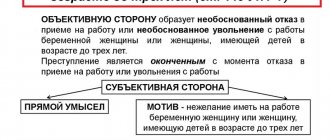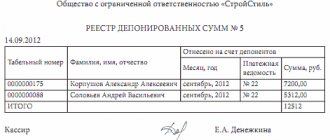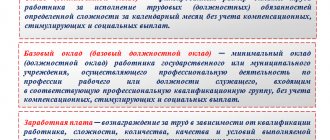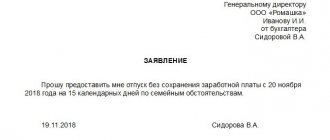Russian legislation has the concept of “delay of wages”, enshrined in the Labor Code. For late payment, the employee is entitled to compensation. He also has the right not to go to work if the delay is 15 days or more. In addition, the employee can convene a labor dispute commission, appeal to the Labor Inspectorate or court.
The concept of “non-payment of wages” is enshrined in the Criminal Code of the Russian Federation (Article 145.1). Non-payment means the deliberate withholding of funds that make up the salary fund for personal gain or personal interests. For example, the owner of a factory did not pay employees for several months, citing difficult times. And with the money saved, he opened a new production workshop. Or the chief accountant, instead of paying the salary of one of her subordinates, awarded herself a bonus for three months in a row.
How to punish a selfish employer
Non-payment may be partial or incomplete. By partial we mean a salary reduction of more than half, without reducing the amount of work and the consent of the employee. Complete - no transfers to the card, pay slips or other evidence of salary receipt. The terms and penalties for these offenses are shown in the table below.
| Crime | Delay period | Amount of fine | Deprivation of liberty | Other types of punishment |
| Partial non-payment of wages | over 3 months | up to 120 thousand rubles | up to 1 year | Forced labor, ban on holding certain positions |
| Complete non-payment of wages | over 2 months | up to 500 thousand rubles | up to 3 years | Forced labor, ban on holding certain positions |
| Non-payment of wages resulting in serious consequences | Over 2 months | Up to 500 thousand rubles | Up to 5 years | Prohibition on holding certain positions |
The practice of considering claims in such cases shows that the court combines the above types of punishments, depending on the severity of the crimes, the indictments of investigators, the testimony of witnesses and other factors.
Labor legislation
All working citizens have the right to monetary remuneration for their work without discrimination and not lower than the approved minimum wage (Article 37 of the Constitution, Article 21 of the Labor Code of the Russian Federation).
The employer is obliged to pay earned money to employees within the terms established by the internal acts of the organization: labor and collective agreements, labor regulations (Article 22 of the Labor Code of the Russian Federation).
Each employee has the right to receive a salary on time, in full and in an amount not lower than the minimum established by the state. According to Art. 142 of the Labor Code of the Russian Federation, it must be paid twice a month .
From 09/03/16, monthly wages must be paid by the 15th day of the month following the month worked (Law No. 272-FZ of 07/03/16).
Failure to pay wages on time is a crime against working citizens . The severity of this official arbitrariness lies in the fact that it infringes on the interests of the worker: it undermines their social stability, and violates the constitutional right to remuneration for work.
Responsibility for the employer begins from the first day of delay, and from the 16th - employees have the right to stop performing their work duties. They must communicate their intention to the employer in writing. At the same time, they are still entitled to a salary: at least 2/3 of the average.
Persons guilty of non-payment of wages to employees are subject to material, administrative and criminal liability.
Delay and non-payment of wages - what's the difference?
In the first case, there is no need to prove the fact of self-interest or intent on the part of the employer. Delay can also be sued, and it will be enough to provide evidence of failure to pay on time. But the manager can only be brought to administrative responsibility. To go to court under Article 145.1 of the Criminal Code of the Russian Federation, you need to prove the fact of self-interest and personal interest of the head of the enterprise in ensuring that his employees are left without money. This is usually difficult to do.
Another difference is the statute of limitations. In a situation where payment is delayed, the employee can go to court within two months. The statute of limitations for non-payment of wages is one year.
We will help you return your money and receive compensation - contact us
As in the case of delayed wages, the employee has the right to demand the liquidation of debts in the event of full or partial non-payment. He also has the right to compensation, which is calculated using the formula: monthly salary * 1/150 of the refinancing rate of the Central Bank of the Russian Federation * number of days of delay. Finally, he has the right to demand compensation for moral damages.
If you are faced with non-payment of wages and do not know what to do, call or write to us. An experienced labor lawyer will tell you where to go to get your money back.
Bringing the director to criminal liability under Article 145-1 of the Criminal Code of the Russian Federation
Bringing a director to criminal liability under Article 145.1 of the Criminal Code of the Russian Federation is no longer something outstanding; it is a long-established and quite stable practice. Article 145.1 of the Criminal Code of the Russian Federation is not so harmless, despite the slight gravity of the act. Directors of various levels are brought in under this article quite regularly; moreover, a significant portion still end up in court and sentencing in particular, so this should not be ignored.
It is initiated at the request of a person and, as a rule, is a consequence of a conflict with employees. Initiated with the aim of stimulating the director’s action to pay salaries.
The main points for which they can be charged under Art. 145.1 of the Criminal Code of the Russian Federation.
- partial non-payment of wages for more than three months. (partial is making a payment less than 50% of the amount due for payment.)
- complete non-payment of wages and other things for more than two months.
Punishment for this act ranges from a fine to real imprisonment up to three years in especially serious cases.
They can terminate a criminal case under Article 145.1 of the Criminal Code of the Russian Federation if:
- Termination of a criminal case under Article 145.1 of the Criminal Code of the Russian Federation is possible both on general grounds (reconciliation of the parties, active repentance, expiration of the statute of limitations) and on a special clause provided by the legislator. The condition for terminating the case is quite simple - if the debt is paid in full within two months from the date of initiation of the criminal case. Therefore, if you are summoned and given a decree to initiate a criminal case, then it is enough to bring documents confirming full payment of debts to the investigator and the case will be closed immediately. Thus, the legislator encourages conscientious behavior and gives time to come to their senses.
Necessary conditions for attraction under Art. 145.1 of the Criminal Code of the Russian Federation:
- availability of financial opportunities
- lack of such opportunity due to unlawful actions of the director
The victims will be employees who have not received wages and other payments, both under an employment contract, and those working ATTENTION without employment contracts, but with the knowledge of the employer.
If you have not paid different employees and at different times, you will be punished according to the following scheme;
- if it is proven that there was only one intent (for example, I will not pay everyone at different times to buy a car), then the punishment will only be under Part 2 of Article 145 of the Criminal Code of the Russian Federation,
- if the intent was directed at each employee separately, then they will be punished for each case separately. P.21. Plenum No. 46 of December 25, 2021
There is nothing good in the totality of crimes, especially if the statute of limitations has not expired.
Regarding the statute of limitations, things did not get any better with the release of Plenum No. 46 of 2018 under Article 145.1 of the Criminal Code of the Russian Federation;
P.22. Plenum No. 46 of December 25, 2021 clarified its position on the statute of limitations for the act in question and, moreover, even gave a couple of examples on this issue. The statute of limitations is calculated from the date of repayment of the debt, dismissal of the guilty person or his temporary removal from office. The dismissal of an employee who has not been paid wages does not affect the calculation of the statute of limitations for criminal prosecution of the employer. Comments, I think, are unnecessary in this part.
Evidence in this case is: testimony of victims, witnesses, officials (accountants and other personnel), statements of accounts of the director, legal entity, expert opinion (involved by the investigator or defense to confirm their positions).
Is it necessary to try to match the victims under Article 145.1?
The option is quite good. The positive opinion of the victim is taken into account when assigning punishment (you can read about the negative and positive opinion of the victim here). Victims in such situations only need to get theirs and they don’t want the director’s special blood. Moreover, if you meet the payment deadlines within two months from the date of initiation of the case, then there will be no criminal liability at all.
A few tips in closing.
When calling you to the investigator, there is no need to rush to quickly lay everything out as best you can, testify and provide account statements and local regulations, remember the famous rule from police TV series - “everything you say can be used against you.” To begin with, it is more than recommended to contact a lawyer. In this case, the chances that the investigators and the court will understand you correctly are great, if the case even goes to court. It is also necessary to provide documentation extremely carefully; any piece of paper that seems insignificant in your opinion can turn into the nail in your sentence.
Criminal lawyer in St. Petersburg - Khokhlachev P.G. - tel.
Customer Reviews
Gratitude from gr. Voronova T.A. I express my gratitude to Yuri Vladimirovich for competent, highly professional advice on the issue of “Protection of Consumer Rights”, a clear explanation of my further actions in my situation, as well as gratitude to Olga Anatolyevna for her attentive and sensitive attitude towards visitors. I was glad to meet your agency!
Voronova Tatyana Anatolyevna
tel.
Gratitude from N.S. Khokhlov I am Khokhlov N.S. I express special gratitude to lawyer A.V. Pavlyuchenko who defended my consumer protection rights. I was pleasantly surprised by his professionalism, where he discovered the false address of my defendant registered in the Unified State Register of Legal Entities, and also defended me, as I believe, from the unreasonable decisions of the trial judge. If I need legal assistance in the future, I will only turn to A.V. Pavlyuchenko.
N.S. Khokhlov December 12, 2017
Thanks from Radhuan M.R. Dear Kavaliauskas Vasily Anatolievich. Let me express my sincere gratitude for the qualified legal assistance provided. Thanks to your professionalism, I was able to achieve a decision in my favor. I wish you further prosperity and professionalism.
Radhuan M.R. 06/08/2018
Gratitude from N.A. Uvarova I express my deep gratitude to lawyer Sergei Vyacheslavovich for his attitude towards me and my question. There are no words to describe the feelings of gratitude for the professionalism shown and the greatest human sympathy and understanding! All the best to you! Health, success in work and long life!
Thank you very much! Sincerely, Nadezhda Anatolyevna Uvarova, 07/25/2019
Feedback from Goncharova I, Venera Konstantinovna Goncharova, express my gratitude to Andrey Valerievich Ermakov, Yana Maksimovna Matveeva, Daria Vasilievna Kutuzova and the entire team. I would like to note that the work was completed within the agreed time frame and with good quality. They showed a professional approach and excellent organization of work. I would like to express my gratitude to the entire team for their high-quality work and wish you further development of your company.
Sincerely, Goncharova Venera Konstantinovna.
Review by Minina M.V. I would like to express my deep gratitude to Yuri Vladimirovich Sukhovarov for his competent advice and qualified assistance on my issue.
With gratitude, Minina Margarita Vladimirovna.
Letter of thanks
Thanks to Pavlyuchenko A.V. from Astafieva A.S. I express my gratitude to the Legal Agency and in particular to lawyer Alexander Viktorovich Pavlyuchenko for the work done, high qualifications and high-quality approach. Thanks to Alexander Viktorovich, we managed to achieve a result in court in a case on the protection of consumer rights that I did not even expect. The amount recovered in court even exceeded my expectations. Thank you very much for your qualified work and professionalism.
Sincerely, Astafieva A.S., 03/01/2019
From Pravikovskaya N.B. I express my gratitude to the staff of the legal consultation: Andrei Valerievich and Dmitry Konstantinovich, who helped me resolve the unpleasant situation with the Pyaterochka store.
The issue was resolved in my favor without delay and quickly. They apologized to me and I received monetary compensation, all without lengthy litigation. Once again, thank you very much!
Gratitude from Volkotrub Yuri Vasilyevich Thank you very much for the quality advice on the issue that interests me. With best wishes to Denis Yuryevich Stepanov, who advised me.
Volkotrub Yuri Vasilievich
Severe consequences
If partial or complete non-payment of wages to an employee has led to serious consequences , an even more stringent measure of liability is applied to the employer.
Serious consequences mean , for example, the death of an employee or the deterioration of the condition of a sick family member. A cause-and-effect relationship must be established: evidence that, for example, the wife did not receive an expensive medicine due to unpaid wages to her husband.
Clause 3 of Article 145.1 provides for one of the following penalties:
- fine from 200,000 to 500,000 rubles. or in the amount of earnings (other income) for a period of 1 to 3 years;
- imprisonment for 2-5 years and a ban on holding leadership positions or conducting certain activities for up to 5 years or without it.











